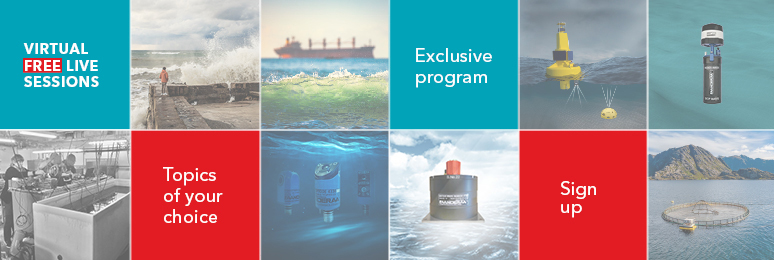| Application | Technology | Project Focused |
Join our experts for our FREE virtual live sessions! Book your session (see the descriptions below) with our team using the form below. The information you provide will be used to match you with our top expert in your geographic region. We'll then follow up to schedule a time to discuss your topic(s) of interest.
Register for your Session(s):

Session Descriptions:
|
Application
|
|
|
Marine Transport:
Safety through available data
|
We will focus on some of the latest hydrography and meteorology monitoring advancements in ports and fairways. Examples of systems with on-line measurements and forecasting to improve navigational safety and port efficiency will also be presented. |
|
Aquaculture:
Data-driven fish health
|
As aquaculture grows, the requirements on the industry increases. The environmental impact should be minimized by reducing the usage of chemicals/antibiotics, feeding optimized, and the living conditions for the produced seafood good to increase the quality. We will present how sensors and systems from Aanderaa play an essential role in this development. |
|
Research:
Understanding seafloor dynamics
|
Biological, chemical, and physical processes at the seafloor play an essential role in aquatic environments. This presentation will describe experiences learned from benthic chamber landers, measurements of different solutes/contaminants, manipulative injection experiments, and methods to increase the data quality. |
|
Research:
From coastal ecology to the deep sea
|
A presentation on how technology can help us understand changes and assess environmental risks in the marine environment. From bottom ecology and marine chemistry to autonomous vehicles and investigations in the deep sea. |
| Technology | |
|
Oxygen Dynamics:
New needs new technology
|
Oxygen is an essential parameter in aquatic research, monitoring, and aquaculture. With the introduction of oxygen optodes in 2002, the technical possibilities to measure O2 were improved. We will present recent findings on oxygen dynamics and how sensors should be handled to optimize data quality. New features like trace O2 detection and more stable foils with better pressure behavior will be presented. |
|
Wave and Current Measurements:
Choice of methods
|
Aanderaa offers three different ways to measure waves. This presentation will compare the three different methods with each other and with dedicated wave buoys. We will discuss their advantages and shortcomings, and best practices to measure waves and currents from floating platforms and underwater installations will be presented. |
|
Autonomous Platform Sensor Solutions
|
This application-focused presentation will give examples of how smart sensors from Aanderaa have been used for environmental measurements from autonomous platforms. From surface roaming systems to Floats/Gliders/AUVs to bottom landers. |
|
New Technology for Ocean and Coastal Observation |
In this presentation, we will give you an overview of the latest and upcoming technology from Aanderaa. We will present improved conductivity/salinity measurements and a new, improved turbidity sensor that can be combined with current and acoustic measurements from current profilers. We will also discuss new versions of the oxygen optodes. |
| Project Focused | |
| Decadal Changes in the Coastal Environment |
During the last 25 years, an elaborate marine monitoring program has been in operation in the Oresund straight, entrance to the Baltic Sea. It includes yearly bottom fauna sampling, sediment chemistry including pollutants, persistent toxins in mussels, run-off from land, and recent pollution from ships. In this presentation, we will present the program findings and success.
|
| Monitoring and Sustainable Management of Wrecks and Dump Sites |
Wrecks with oil and dumped chemical weapons corroding and exposed to the marine environment can cause contamination and health risks for the marine environment and humans. This presentation is about fieldwork and developing a decision support method for sustainable management of oil polluting wrecks and chemical munitions dumpsites in the Baltic Sea. |
| Coastal Nutrient Loads: The Importance of Sediments |
In coastal zones, sediments play a significant environmental role by taking up or releasing nutrients and other solutes. We will present project findings from The Baltic Sea, where the effects of sediment resuspension and low oxygen were in particular focus. It turned out that the sediments supplied 80% of the phosphate load. |

